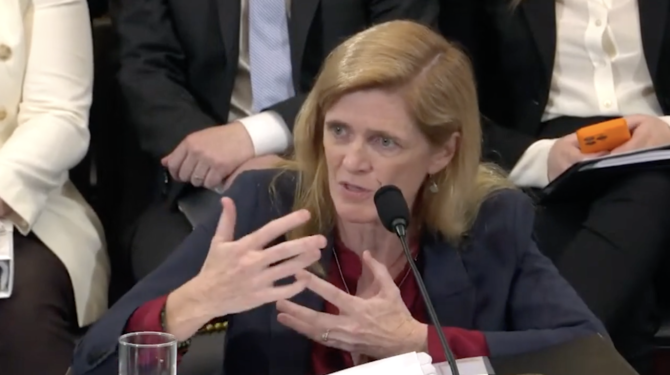LONDON: The head of the US Agency for International Development has said she accepts “credible” reports that famine is now occurring in northern Gaza.
Samantha Power, who spoke at a congressional hearing on Wednesday, said famine is “plausible or likely” in the embattled enclave and that short of actual famine, civilians in all areas of Gaza are suffering from extreme malnutrition, especially children.
She urged Israel to take further steps to substantially increase humanitarian aid shipments, highlighting an assessment of the situation on the ground by the Integrated Food Security Phase Classification initiative, which cited an imminent risk of famine and “catastrophic” food insecurity.
She said the situation for Gaza’s children has become “markedly worse” during Israel’s six-month-long offensive.
“In northern Gaza, the rate of malnutrition prior to Oct. 7 was almost zero, and it’s now one in three kids,” she added.
“In terms of actual severe acute malnutrition for (children under 5 years old), that rate was 16 percent in January and became 30 percent in February. We’re awaiting the March numbers, but we expect it to continue.”
White House press secretary Karine Jean-Pierre on Thursday was asked to comment on Power’s testimony and the IPC report.
Jean-Pierre said the findings indicate that “famine is imminent in Gaza,” adding: “We’re certainly deeply concerned about these reports, and so we’ve been working around the clock to get more of that aid into Gaza.”
She said US President Joe Biden is working to increase the flow of humanitarian aid into Gaza, and rebutted questions from The Independent newspaper about why he had not done more to push Israel to allow aid in.
“The president has been working around the clock, so I take offense to what you’re saying because it isn’t true,” she added.
“The president has been working on this hostage deal for months now … And that’s a way to make sure that there’s a temporary ceasefire that could hopefully lead to something longer, get those hostages home, and get humanitarian aid.”
Last week in Brussels, US Secretary of State Antony Blinken said Palestinians in Gaza are suffering from acute food insecurity.
“Despite important steps that Israel has taken to allow assistance into Gaza, the results on the ground are woefully insufficient and unacceptable,” he told reporters at a news conference at NATO headquarters.
“A hundred percent of the population in Gaza knows acute levels of food insecurity. A hundred percent of the population is in need of humanitarian assistance.”

























